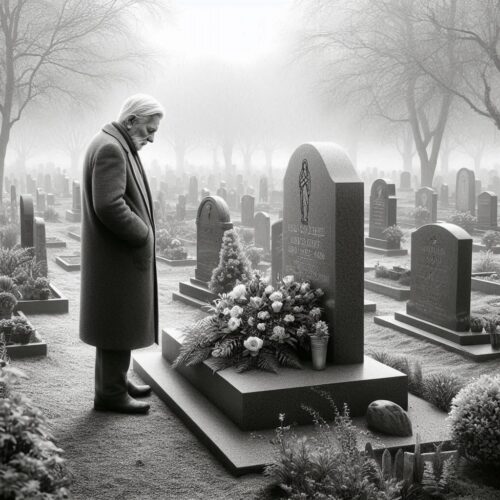Life After Death: Can Our Deceased Loved Ones See Us Now?
Grief creates a profound ache—a longing to reconnect with those we’ve lost. Many Christians wonder: Can our deceased loved ones see us? The question emerges from curiosity, perhaps, or a deeply human desire for continued connection, yet demands careful theological examination.
The Christian perspective transcends mere emotional speculation. Our understanding must be anchored in Scripture, guided by God’s revealed truth, rather than personal sentiment or cultural myths about the afterlife.
Exploring the Bible for Clues
Let’s be direct: There aren’t any verses that conclusively tell us whether the deceased can indeed see us. Any interpretation requires humility, acknowledging the limits of our understanding about the spiritual realm.
Having said that, Scripture does offer tantalising glimpses that invite careful reflection rather than definitive conclusions. Take Revelation 6:9-11, where John describes martyred saints—who speak to God and are aware of earthly events—asking about God’s justice. Yet, this passage, like others, offers more questions than answers.
The parable of the Rich Man and Lazarus (Luke 16:19-31) suggests the deceased are in fact conscious after death. However, we cannot confidently extrapolate that this means they can observe what’s happening on earth. Similarly, Hebrews 12:1’s “cloud of witnesses” metaphor—often cited in this discussion—provides poetic imagery but no concrete proof these dead saints can see us.
These biblical passages remind us the spiritual realm does exist and that we shall be conscious there. Its precise nature, however, remains a mystery. We’re invited to trust, not to speculate.
The Reformed Fathers Offer No Guesses
The Reformed theological tradition approaches the question with remarkable restraint. John Calvin consistently warned against supernatural speculation, emphasising the believer’s primary focus must be God’s glory, not curiosity about the intermediate state.
Jonathan Edwards was even more pointed. In his writings, he stressed entering God’s presence so transforms consciousness that earthly attachments become insignificant. The believer’s new spiritual reality is so complete, so consuming, that peripheral concerns simply dissolve.
The Reformed tradition also cautions us strongly against:
- Spiritistic practices
- Emotional sentimentalism about the afterlife
- Turning grief into a form of quasi-worship
- Distracting ourselves from God’s sovereignty
What Scripture Suggests About Heavenly Perspective
The biblical witness suggests a profound spiritual transformation that fundamentally alters consciousness. Believers enter a state of complete satisfaction in God’s presence—a reality so overwhelming that earthly attachments naturally recede.
This doesn’t mean our loved ones forget us, rather that their perspective is radically reoriented. Their primary focus becomes the unmediated glory of God—a joy so complete that our earthly concerns pale in comparison.
Imagine standing before ultimate beauty, perfect love, and infinite wisdom. Would the mundane details of earthly life still command attention? The Reformed understanding suggests a resounding no.
Comfort for Grieving Believers
For the Christian, death isn’t a permanent separation but a temporary transition. The same God who knows every hair on our head (Matthew 10:30) holds our departed loved ones in perfect, eternal care.
This perspective offers deeper comfort than the notion of loved ones watching from above. It promises something infinitely more beautiful: a future where all tears are wiped away, where suffering ends, and where we experience perfect relationship with God and each other.
Conclusion
The question “Can our deceased loved ones see us?” ultimately reveals our human longing for connection. Yet, the Christian hope transcends this limited perspective. We’re called to fix our eyes not on what’s seen, but on what’s unseen—to trust in God’s sovereign plan and the promise of eternal life in Christ.
Our comfort isn’t in imagining our loved ones are watching, but in knowing they’re perfectly satisfied in God’s presence. Our hope isn’t in maintaining earthly connections, but in the promise of a future resurrection where all things are made new. Radically new.
Can Our Deceased Loved Ones See Us?—Related FAQs
Does the Bible teach about purgatory? Reformed theology categorically rejects the concept of purgatory as unbiblical. We believe Christ’s sacrifice provides complete atonement, and believers transition directly to eternal life with God upon death.
- What is the doctrine of the communion of saints? The communion of saints describes the spiritual unity of all believers in Christ, transcending physical death and earthly boundaries. This doctrine emphasises our connectedness through Christ, not through mystical observation or communication between realms.
- How do we understand near-death experiences theologically? Reformed theology approaches near-death experiences with biblical caution, prioritising Scripture over subjective experiences. While not dismissing all testimonies, we must measure such accounts against God’s revealed truth.
Can deceased believers influence events on Earth? Scripture provides no evidence that deceased saints directly influence earthly events. Our focus should remain on God’s sovereign providence and the completed work of Christ.
- What happens to unbelievers immediately after death? Scripture indicates a clear separation between believers and non-believers upon death. Unbelievers face spiritual separation from God, while believers enter Christ’s immediate presence.
- Do guardian angels exist? Scripture references angels as ministering spirits, but not in the popular cultural sense of personal guardians. God’s direct providence remains the primary source of protection and guidance.
Can we communicate with deceased loved ones? Absolutely not. Scripture strongly condemns necromancy and any attempts to communicate with the dead. Our hope and comfort come exclusively through Christ and His promises.
Editor's Pick

Should We Stop Using Male Pronouns for God? Why Do We Say No?
A friend of ours arrived eagerly at his first theology class in seminary. But he quickly discovered something troubling: the [...]

Did Old Testament Law Force Women to Marry their Rapists?
**Editor’s Note: This post is part of our series, ‘Satan’s Lies: Common Deceptions in the Church Today’… Viral misinformation abounds [...]

From Danvers To Nashville: Two Statements, One Biblical Vision
30 years separate the Danvers Statement on Biblical Manhood and Womanhood (1987) and the Nashville Statement on Human Sexuality (2017). [...]

The Nashville Statement: Why Affirm It Despite Media Backlash?
WHY DO REFORMED CHRISTIANS STAND BY THIS STATEMENT ON MARRIAGE AND GENDER? When the Nashville Statement was released in 2017, [...]

Who Is Belial? Solving The 2 Corinthians 6:15 Mystery
Belial: This name from the pages of Scripture chills the soul. Who is this mysterious figure Paul invokes in 2 [...]

Celibacy Or Castration: What Jesus Really Means in Matthew 19:12
One of Scripture's most shocking misinterpretations led theologian Origen to castrate himself in the third century. His tragic mistake? Taking [...]

Philippians 4:13: Did Paul Really Mean We Can Do ALL Things?
"I can do all things through Christ who strengthens me." It's on gym walls, graduation cards, and motivational posters everywhere. [...]

The Ordinary Means of Grace: Why Are They Indispensable?
ORDINARY MEANS FOR EXTRAORDINARY TRANSFORMATION What if God's most powerful work in believers' lives happens through the most ordinary activities? [...]

Is the Bible God’s Word? Or Does It Only Contain God’s Word?
The authority of Scripture stands at the crossroads of modern Christianity. While some argue the Bible merely contains God’s Word [...]

Will We Remember This Life in Heaven? What Isaiah 65:17 Means
"Will I remember my spouse in heaven? My children? Will the joy we shared on earth matter in eternity?" These [...]
SUPPORT US:
Feel the Holy Spirit's gentle nudge to partner with us?
Donate Online:
Account Name: TRUTHS TO DIE FOR FOUNDATION
Account Number: 10243565459
Bank IFSC: IDFB0043391
Bank Name: IDFC FIRST BANK






